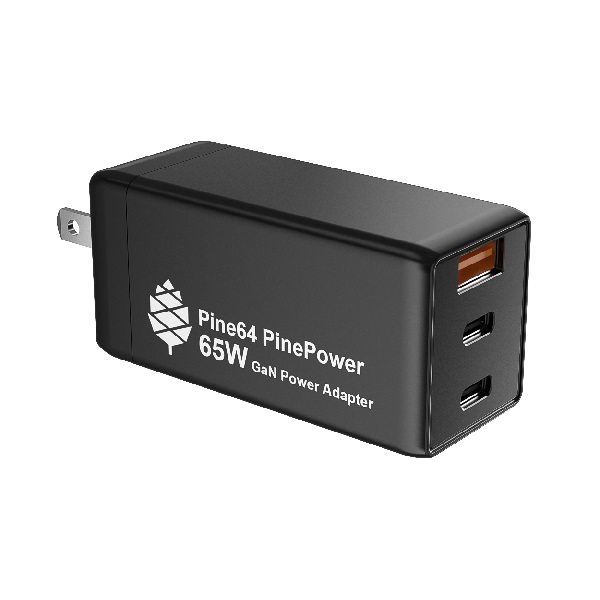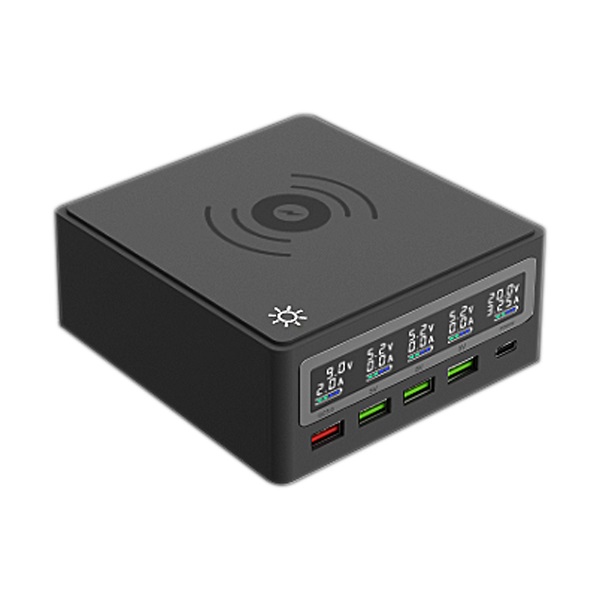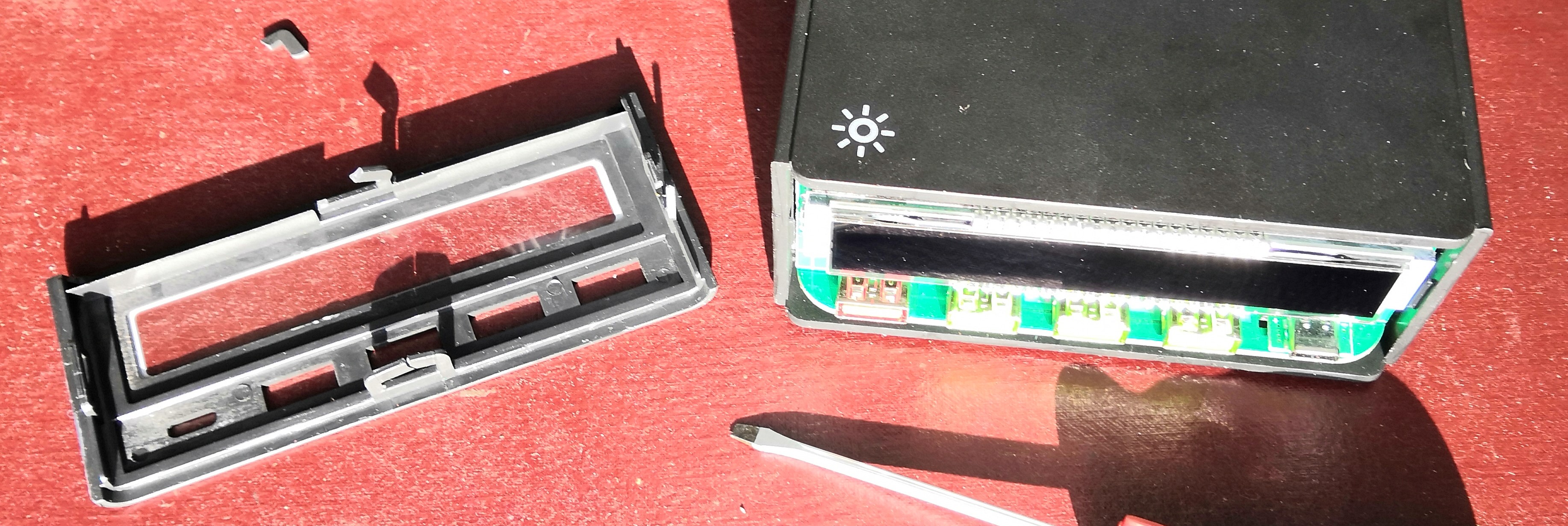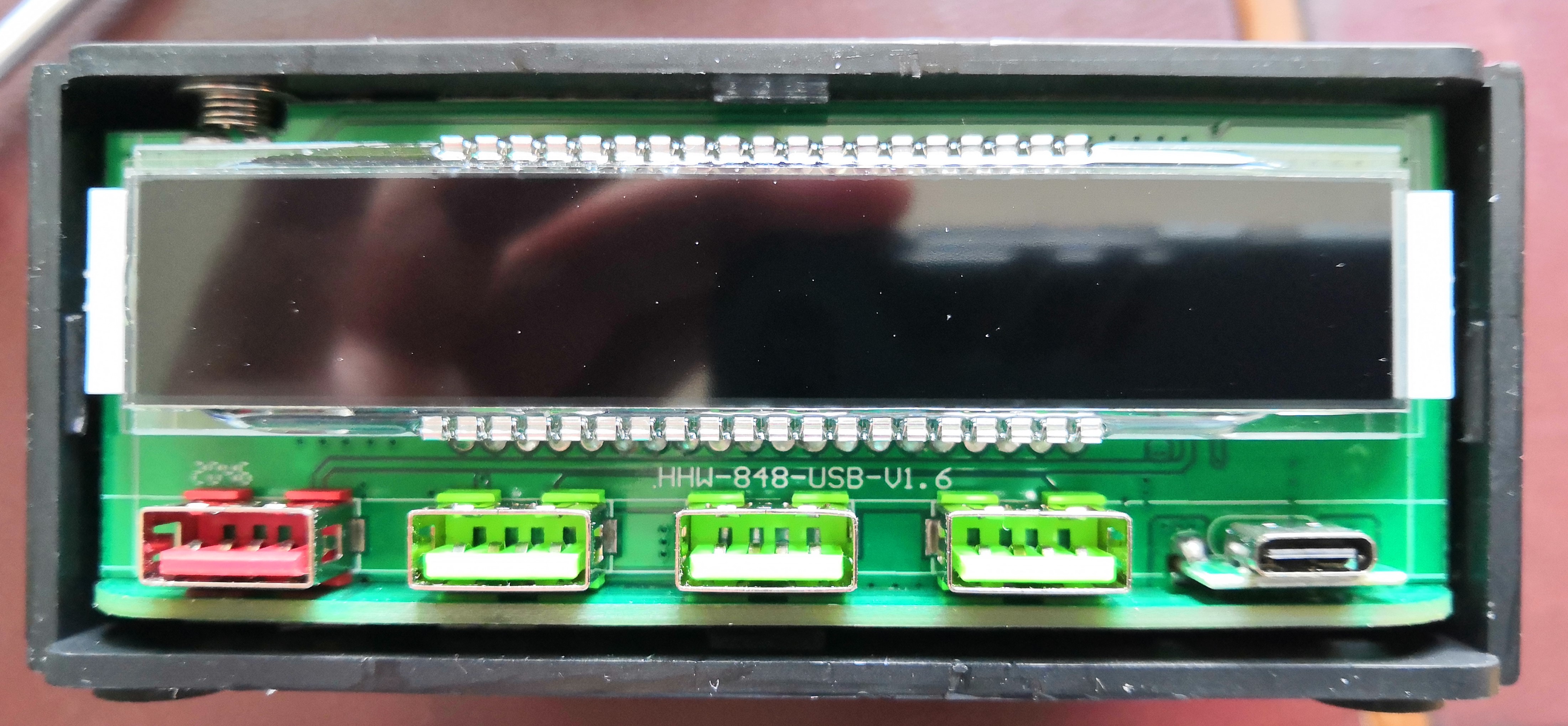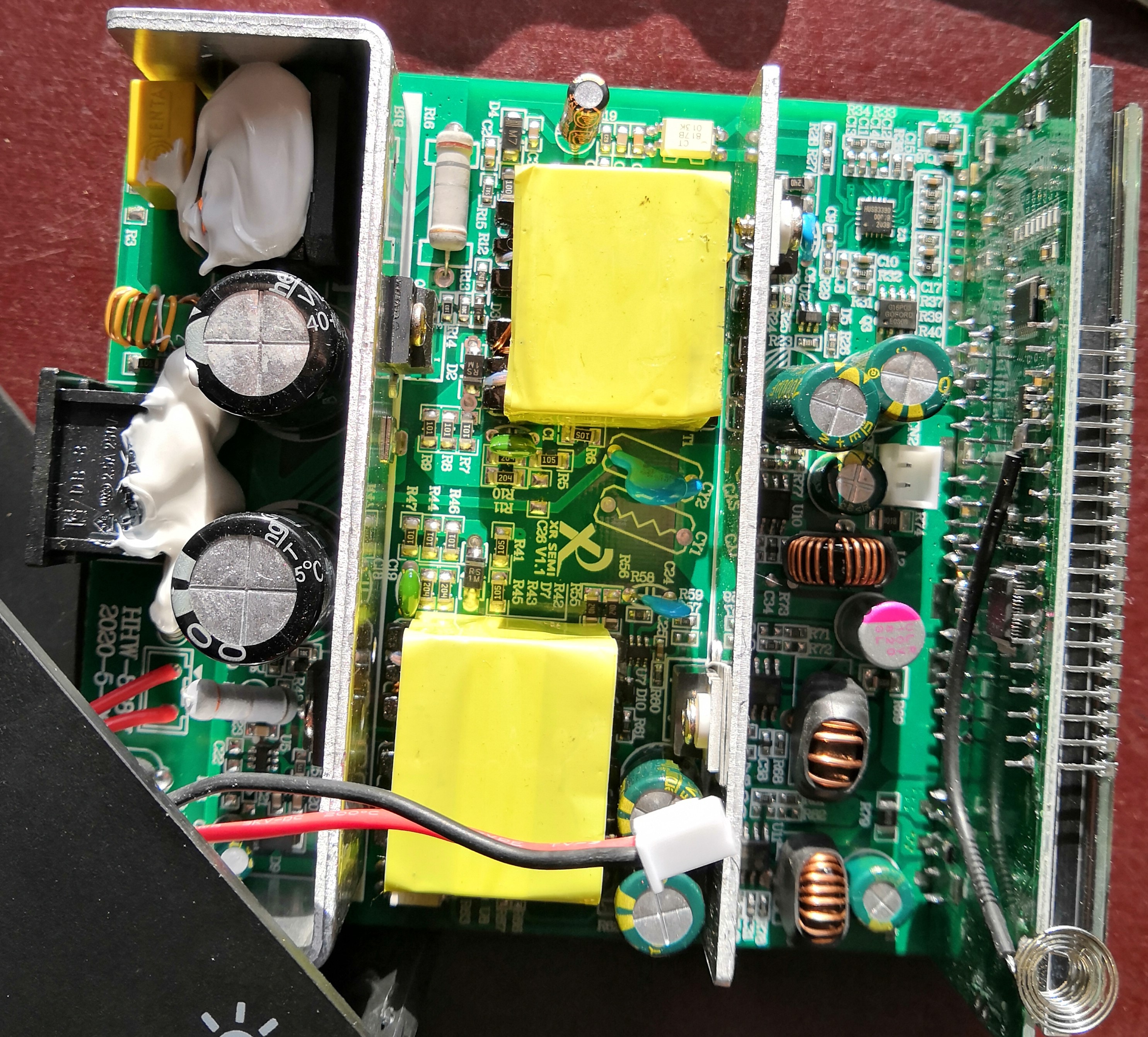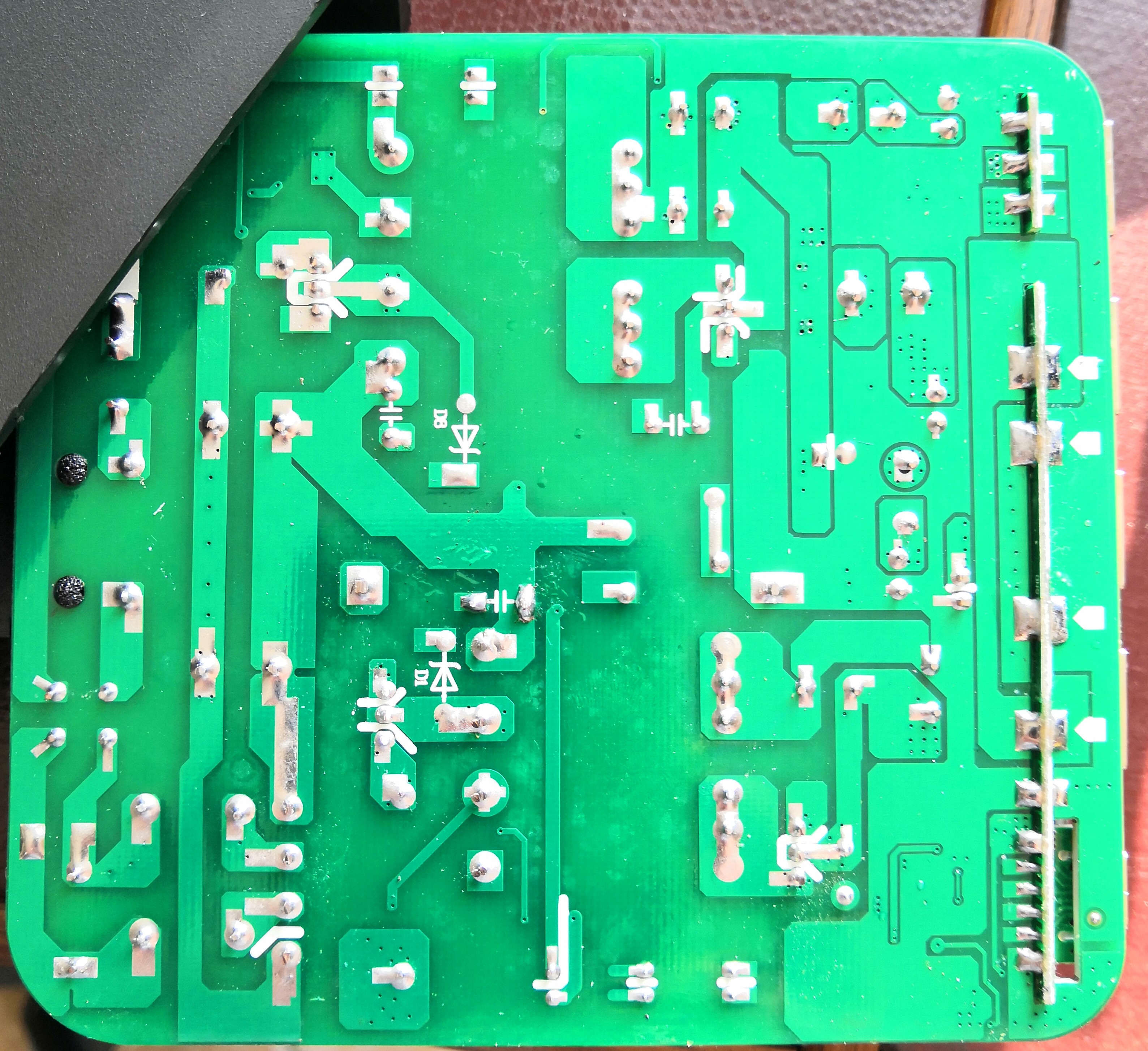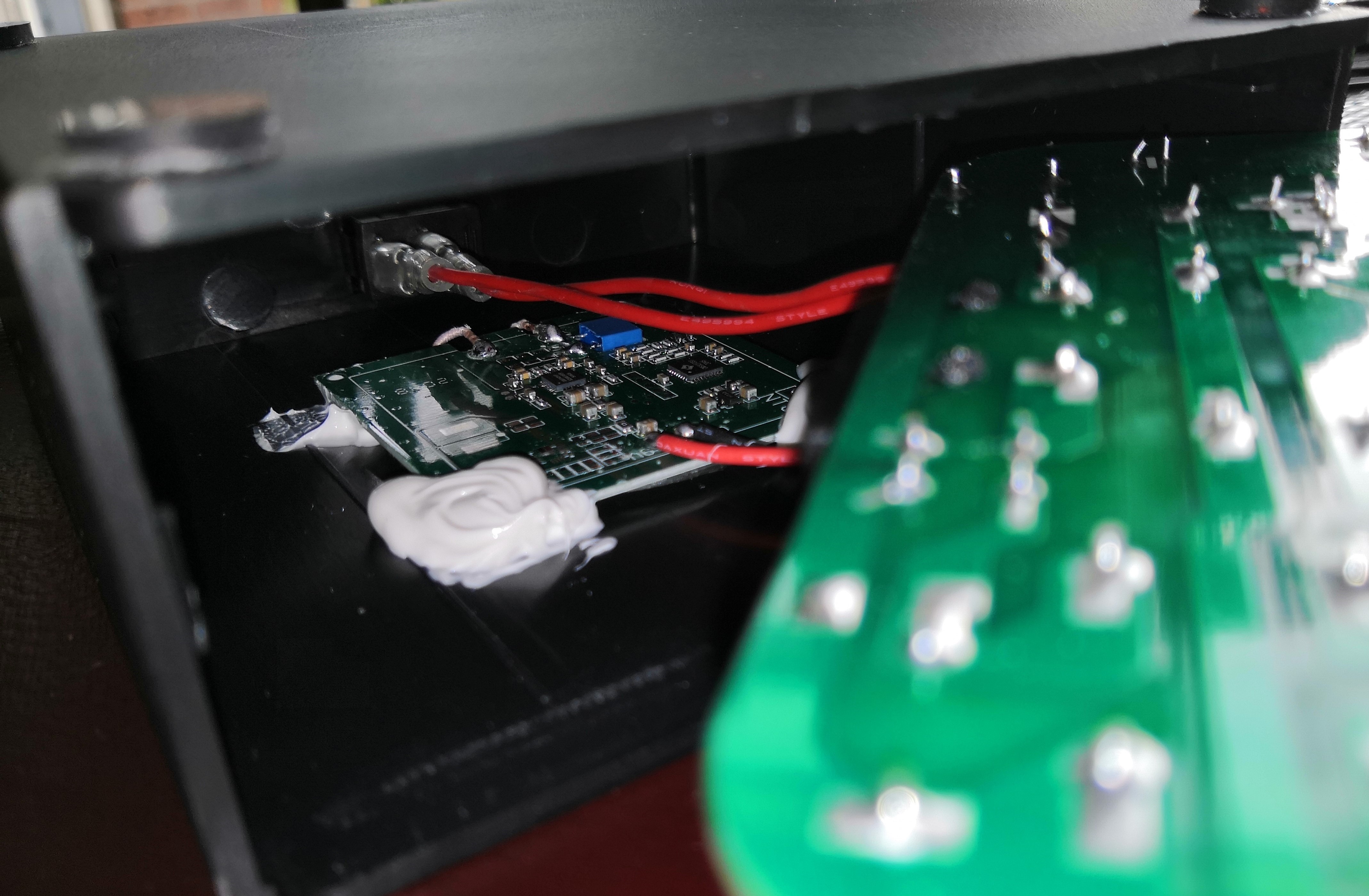Difference between revisions of "PinePower"
(→External links: style) |
(Fixes) |
||
| Line 4: | Line 4: | ||
== PinePower 65W GaN Charger == | == PinePower 65W GaN Charger == | ||
The PinePower is a small and compact palm size 65W wall socket power adapter. | The PinePower is a small and compact palm size 65W wall socket power adapter. It features 2 USB-C ports and 1 USB-A port charger. [https://en.wikipedia.org/wiki/Gallium_nitride Gallium Nitride] technology ensures a small and light charger with high charging efficiency. It has a retractable US plug. | ||
===General specifications=== | === General specifications === | ||
Body | Body: | ||
Power | * Dimensions: 74.8mm x 36.6mm x 32mm | ||
*Input: | * Weight: 130 grams | ||
*Output: 65W | * Build: Plastic | ||
*Power switch | * Color: Black | ||
Power: | |||
* Input: AC 100-240V 50/60Hz 1.5A Max | |||
* Output: 65W | |||
* Power switch | |||
Connections: | |||
* 240Vac input US plug, adapters for AU, EU, and UK, | * 240Vac input US plug, adapters for AU, EU, and UK, | ||
* 1x USB-A | * 1x USB-A | ||
| Line 30: | Line 33: | ||
! Power ranges QC | ! Power ranges QC | ||
! Power ranges PPS | ! Power ranges PPS | ||
|- | |- | ||
| Single USB-C1 or C2 | | Single USB-C1 or C2 | ||
| Line 44: | Line 46: | ||
| - | | - | ||
|- | |- | ||
|USB-C1 & | |USB-C1 & | ||
USB-C2 combined | USB-C2 combined | ||
| Line 56: | Line 57: | ||
| - | | - | ||
|- | |- | ||
| USB-C1 & | | USB-C1 & | ||
USB-A combined | USB-A combined | ||
| Line 70: | Line 70: | ||
| - | | - | ||
|- | |- | ||
|USB-C1 & | |USB-C1 & | ||
USB-C2 + USB-A combined | USB-C2 + USB-A combined | ||
| Line 83: | Line 82: | ||
|} | |} | ||
===Internals=== | === Internals === | ||
''TBA'' | ''TBA'' | ||
== PinePower 120W Desktop Power Supply == | == PinePower 120W Desktop Power Supply == | ||
[[File:PinePower-Desktop-2.jpg|400px|thumb|right|PinePower Desktop 120W render]] | [[File:PinePower-Desktop-2.jpg|400px|thumb|right|PinePower Desktop 120W render]] | ||
A 120W desktop power adapter. It features 1 USB-C port and 4 USB-A port. The 120W output is not per port, but total output power. This is calculated by combining the 65W USB-C, 3x15W USB-A and the 18W USB-A QC, making a total of 128W. The only difference between the US and EU edition is the supplied power cable. Every port, with exception of the wireless Q-charger, has a display, portraying the output voltage and amps. The display back light can be turned on and off by capacitive touch button, located on the top left side of the unit. | A 120W desktop power adapter. It features 1 USB-C port and 4 USB-A port. The 120W output is not per port, but total output power. This is calculated by combining the 65W USB-C, 3x15W USB-A and the 18W USB-A QC, making a total of 128W. The only difference between the US and EU edition is the supplied power cable. Every port, with exception of the wireless Q-charger, has a display, portraying the output voltage and amps. The display back light can be turned on and off by capacitive touch button, located on the top left side of the unit. | ||
=== General specifications === | |||
Body: | |||
Power | * Dimensions: 123mm x 115mm x 48mm | ||
*Input: | * Weight: 543 grams | ||
*Output: 120w | * Build: Plastic | ||
* Color: Black | |||
Display: | |||
* Individual port voltage status display | |||
* Individual port current status display | |||
Controls: | |||
* Mains power toggle switch | |||
* Capacitive power output display switch | |||
Power: | |||
* Input: AC 100-240V 50/60Hz ?A Max | |||
* Output: 120w | |||
Connections: | |||
* 110/240VAC input (either US/EU/UK figure of 8 plug is supplied) | * 110/240VAC input (either US/EU/UK figure of 8 plug is supplied) | ||
* 4x USB-A | * 4x USB-A | ||
| Line 114: | Line 121: | ||
=== Power specifications === | === Power specifications === | ||
{| class="wikitable" | {| class="wikitable" | ||
! Output | ! Output | ||
| Line 121: | Line 129: | ||
! Power ranges | ! Power ranges | ||
|- | |- | ||
| USB-C | | USB-C | ||
| [https://en.wikipedia.org/wiki/USB_hardware#USB_Power_Delivery_(USB_PD) PD] | | [https://en.wikipedia.org/wiki/USB_hardware#USB_Power_Delivery_(USB_PD) PD] | ||
| Line 128: | Line 135: | ||
| 5V3A, 9V3A, 12V3A, 15V3A, 20V3.25A | | 5V3A, 9V3A, 12V3A, 15V3A, 20V3.25A | ||
|- | |- | ||
| USB-A | | USB-A | ||
| [https://en.wikipedia.org/wiki/Quick_Charge QC] | | [https://en.wikipedia.org/wiki/Quick_Charge QC] | ||
| Line 135: | Line 141: | ||
| 5V3A, 9V2A, 12V1.5A | | 5V3A, 9V2A, 12V1.5A | ||
|- | |- | ||
| USB-A | | USB-A | ||
| USB | | USB | ||
| Line 142: | Line 147: | ||
| 5V3A | | 5V3A | ||
|- | |- | ||
| Wireless charger | | Wireless charger | ||
| [https://en.wikipedia.org/wiki/Qi_(standard) Qi] | | [https://en.wikipedia.org/wiki/Qi_(standard) Qi] | ||
| Line 150: | Line 154: | ||
|} | |} | ||
===Internals=== | === Internals === | ||
The power unit is not made to be disassembled, do so at your own risk. The front plate is secured with 4 tabs, that can be disengaged with a screwdriver. The complete assembly can be slid out, but do mind the same tab in the casing. The power button at the back of the case has a plug that can be disconnected from the main PCB. The wireless charging PCB has to be de-soldered, or forcefully removed from the inner casing, as it is glued to the top of the case. | The power unit is not made to be disassembled, do so at your own risk. The front plate is secured with 4 tabs, that can be disengaged with a screwdriver. The complete assembly can be slid out, but do mind the same tab in the casing. The power button at the back of the case has a plug that can be disconnected from the main PCB. The wireless charging PCB has to be de-soldered, or forcefully removed from the inner casing, as it is glued to the top of the case. | ||
| Line 164: | Line 168: | ||
Some remarks: | Some remarks: | ||
*This main PCB is marked as XR SEMI v1.1 | |||
*Two unmarked packages, control the display. | * This main PCB is marked as XR SEMI v1.1 | ||
*An antenna is connected on the display PCB, lining up with the 'lamp' symbol. This is the capacitive touch button to control the display back light. | * Two unmarked packages, control the display. | ||
*The 65W PD USB-C port is controlled by a [http://www.hynetek.com/product/pdController/HUSB339/document/HUSB339_DS_EN_V1.2.pdf HUSB339] controller, paired with a GOFORD G16 MOSFET. | * An antenna is connected on the display PCB, lining up with the 'lamp' symbol. This is the capacitive touch button to control the display back light. | ||
*The other ports have a [http://www.lshchip.com/pdf/Deep-pool/NDP1360KC_EN_Rev1.1.pdf NDP1360KC] as final power converter. | * The 65W PD USB-C port is controlled by a [http://www.hynetek.com/product/pdController/HUSB339/document/HUSB339_DS_EN_V1.2.pdf HUSB339] controller, paired with a GOFORD G16 MOSFET. | ||
* The other ports have a [http://www.lshchip.com/pdf/Deep-pool/NDP1360KC_EN_Rev1.1.pdf NDP1360KC] as final power converter. | |||
== External links == | == External links == | ||
Revision as of 18:00, 4 April 2023
The PinePower devices (the PinePower and the PinePower Desktop) are power supplies, which pack plenty of power. They capable of powering or charging multiple PINE64 devices, such as the Pinebook Pro, PinePhone and the PineTime simultaneously.
PinePower 65W GaN Charger
The PinePower is a small and compact palm size 65W wall socket power adapter. It features 2 USB-C ports and 1 USB-A port charger. Gallium Nitride technology ensures a small and light charger with high charging efficiency. It has a retractable US plug.
General specifications
Body:
- Dimensions: 74.8mm x 36.6mm x 32mm
- Weight: 130 grams
- Build: Plastic
- Color: Black
Power:
- Input: AC 100-240V 50/60Hz 1.5A Max
- Output: 65W
- Power switch
Connections:
- 240Vac input US plug, adapters for AU, EU, and UK,
- 1x USB-A
- 2x USB-C
Power specifications
| Output | Max output power | Power ranges PD | Power ranges QC | Power ranges PPS |
|---|---|---|---|---|
| Single USB-C1 or C2 | 65W | 5V3A, 9V3A, 12V3A, 15V3A, 20V3.5A | - | 3.3-11V5A |
| Single USB-A | 65W | - | QC3.0 4.5V5A, 5V4.5A, 9V3A, 12V3A, 20V3A | - |
| USB-C1 &
USB-C2 combined |
|
|
- | - |
| USB-C1 &
USB-A combined |
|
|
|
- |
| USB-C1 &
USB-C2 + USB-A combined |
|
|
- | - |
Internals
TBA
PinePower 120W Desktop Power Supply
A 120W desktop power adapter. It features 1 USB-C port and 4 USB-A port. The 120W output is not per port, but total output power. This is calculated by combining the 65W USB-C, 3x15W USB-A and the 18W USB-A QC, making a total of 128W. The only difference between the US and EU edition is the supplied power cable. Every port, with exception of the wireless Q-charger, has a display, portraying the output voltage and amps. The display back light can be turned on and off by capacitive touch button, located on the top left side of the unit.
General specifications
Body:
- Dimensions: 123mm x 115mm x 48mm
- Weight: 543 grams
- Build: Plastic
- Color: Black
Display:
- Individual port voltage status display
- Individual port current status display
Controls:
- Mains power toggle switch
- Capacitive power output display switch
Power:
- Input: AC 100-240V 50/60Hz ?A Max
- Output: 120w
Connections:
- 110/240VAC input (either US/EU/UK figure of 8 plug is supplied)
- 4x USB-A
- 1x USB-C
Power specifications
| Output | Protocol | Version | Max output power | Power ranges |
|---|---|---|---|---|
| USB-C | PD | ? | 65W | 5V3A, 9V3A, 12V3A, 15V3A, 20V3.25A |
| USB-A | QC | 3.1 | 18W | 5V3A, 9V2A, 12V1.5A |
| USB-A | USB | ? | 15W | 5V3A |
| Wireless charger | Qi | 1.2 | 10W | - |
Internals
The power unit is not made to be disassembled, do so at your own risk. The front plate is secured with 4 tabs, that can be disengaged with a screwdriver. The complete assembly can be slid out, but do mind the same tab in the casing. The power button at the back of the case has a plug that can be disconnected from the main PCB. The wireless charging PCB has to be de-soldered, or forcefully removed from the inner casing, as it is glued to the top of the case.
Some remarks:
- This main PCB is marked as XR SEMI v1.1
- Two unmarked packages, control the display.
- An antenna is connected on the display PCB, lining up with the 'lamp' symbol. This is the capacitive touch button to control the display back light.
- The 65W PD USB-C port is controlled by a HUSB339 controller, paired with a GOFORD G16 MOSFET.
- The other ports have a NDP1360KC as final power converter.
